- SWIFT sanctions target Russian assets
- Global companies distance from Russian businesses
- Treasuries waver
- US dollar advances
- US President Joseph Biden's State of the Union address on Tuesday.
- On Tuesday Manufacturing PMI data is published.
- Fed Chair Jerome Powell testifies to Congress on monetary policy on Wednesday and Thursday.
- The STOXX 600 fell 1.1%
- Futures on the S&P 500 fell 1.4%
- Futures on the NASDAQ 100 fell 1.2%
- Futures on the Dow Jones Industrial Average fell 1%
- The MSCI Asia Pacific Index rose 1%
- The MSCI Emerging Markets Index rose 1.5%
- The Dollar Index rose 0.5%
- The euro fell 0.5% to $1.206
- The Japanese yen was unchanged at 115.55 per dollar
- The offshore yuan fell 0.1% at 6.3121 per dollar
- The British pound fell 0.06% to $1.3397
- The yield on 10-year Treasuries declined five basis points to 1.91%
- Germany's 10-year yield fell six basis points to 0.20%
- Britain's 10-year yield fell to 1.456%
- WTI crude jumped 6% to $96.47 a barrel
- Brent crude rose 4.57% to $98.44 a barrel
- Spot gold rose 0.9% to $1,906.46 an ounce
Key Events
On Monday, as trading opened for the week, investors immediately sold off US futures for the Dow Jones, S&P 500, NASDAQ and Russell 2000, along with European stocks and even bonds, in response to SWIFT sanctions targeting Russian financial institutions.
Gold traded higher but slipped from session highs.
Global Financial Affairs
Markets have been roiled by the escalating conflict in Ukraine and additional, more severe sanctions from the West. The ongoing hostilities are putting essential commodity supplies, including grain, energy, and metals at risk, which could worsen the pandemic-era inflation levels that were already weighing on the global economy.
This development could impact the US Federal Reserve's plans for a series of interest rate hikes which many believe will start in March. Investors have repositioned bets on aggressive hikes and are now anticipating just under six in 2022.
This morning, all four major US equity contracts were over 1% in the red while European stocks fell after the EU, US, UK, and Canada announced additional sanctions against Russia.
The STOXX 600 index opened 0.6% lower. There were only sellers and the drop extended to 1.55% as of the time of writing. While geopolitics has been the apparent driver of price activity, technicals are also playing their part.
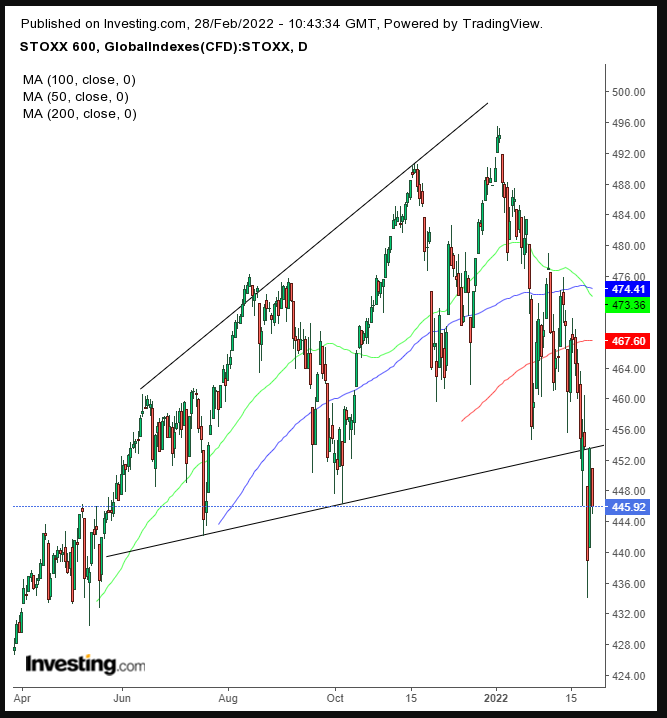
On Friday, the pan-European benchmark rebound stopped precisely on the trend line connecting the lows since July, which we'd characterized as a top.
European financials took the brunt of today's selloffs as the Western allies said they'd block some Russian banks from the SWIFT messaging system. Austria's Raiffeisen Bank (VIE:RBIV) opened 14.65% lower and extended the plunge to as much as 18.67%, its lowest level since November 2020.
Austrian bank shares are down 52% from their Nov. 10 peak. Italy's UniCredit (MI:CRDI) opened 8.46% lower and extended its fall to 10.3%. The lender is down 29% from its Feb. 10 high.
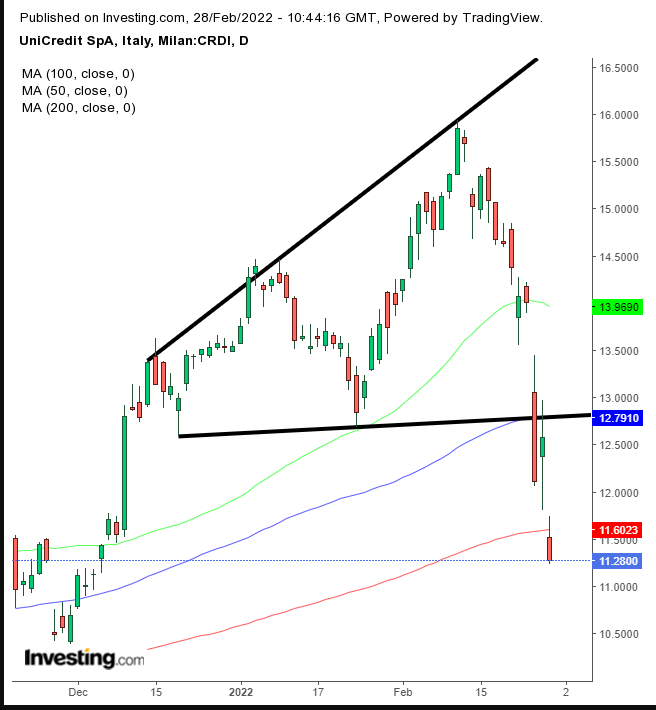
The price blew out an ascending triangle, turning a bullish pattern bearish. France's Societe Generale (PA:SOGN) opened 5.82% down and doubled the crash to 10.21% intraday, with the stock trading at its lowest point so far during the session. Like UniCredit, Societe Generale recently blew out an Ascending Triangle.
We see a pattern of financial institutions moving into bear markets as monetary policy tightens, which is typically when they lead the market into a rally. Overall, the eurozone banking index declined by 5.2% today alone.
Conversely, German defense company Rheinmetall (DE:RHMG) catapulted 43.15% at the open after the country's Chancellor, Olaf Scholz, announced on Sunday that Germany would increase its defense spending to more than 2% of GDP. However, after RHMG rose as much as 47.57%, traders took profit, allowing the price to ease to +27.5% at the time of writing.
The Russian ruble's collapse continued, diving 8% at the open in Moscow, as Russians lined up at ATMs to withdraw foreign currencies on concerns their own currency would completely crater.
After the opening plunge, the ruble's slide accelerated, losing as much as 31.5% of its value and settling at a 21.58% loss at the time of writing, completing its Ascending Triangle.
Russian sovereign bonds had already fallen below investment grade on Friday.
In London, BP (LON:BP) announced it will exit its stake in Rosneft (LON:ROSNq), Russia's largest oil company, risking as much as a $25 billion loss. Norway plans to excise Russian assets from its $1.3 trillion sovereign wealth fund.
Earlier, most Asian shares rose, as regional markets were not directly impacted by European sanctions on Russia. South Korea's KOSPI rose 0.84% on the market narrative that Russia and Ukraine would begin peace talks. However, Ukraine's President Volodymyr Zelenskyy expressed skepticism regarding the talks.
Hong Kong's Hang Seng was the only major regional benchmark in the red. However, that was due to the fact the city is battling a worsening COVID outbreak.
Treasury yields fluctuated, including on the 10-year note. Rates were higher at the time of writing, as investors sold off bonds, despite risk-off sentiment permeating global markets.
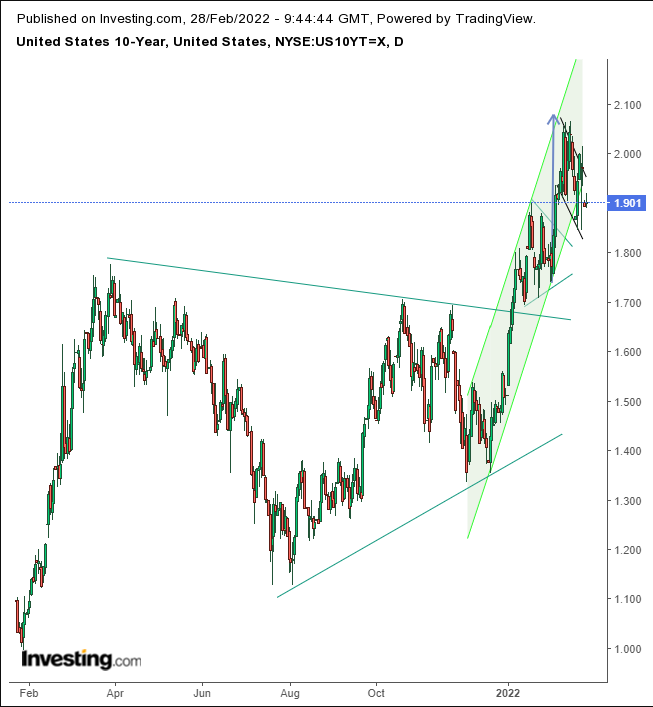
Yields are within a potential back-to-tack continuation pattern following a symmetrical triangle, suggesting rates will rise which is attracting investors away from the equity market.
The dollar opened higher and whipsawed but has remained in the green.
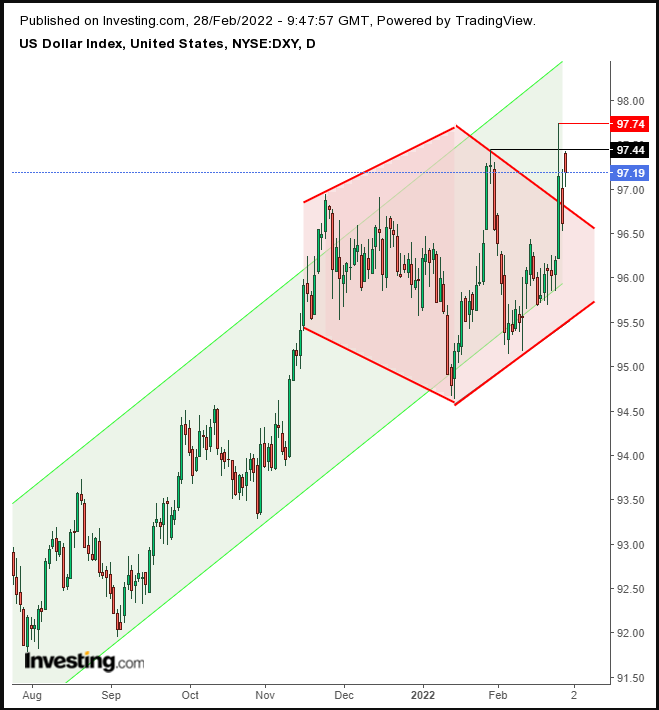
The USD appeared to blow out a potential Diamond pattern, which tends to develop at tops. We would feel more comfortable taking a bullish stance, from a technical perspective if the price closes above its Feb. 24 high of 97.74, but at least above the 97.44, Jan. 28 high.
Gold retreated from session highs but was still higher than Friday's close, after gapping higher at Sunday evening's open before retreating somewhat.
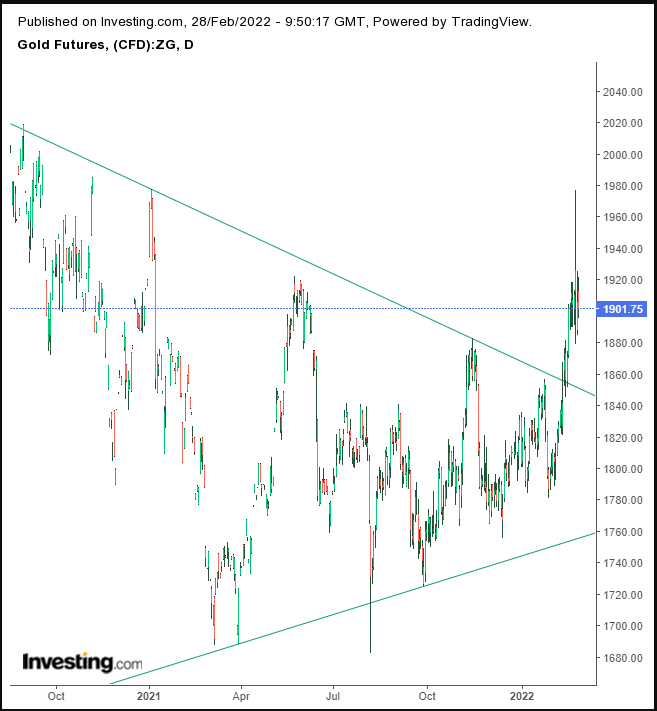
Technically, the yellow metal has had an upside breakout of a large symmetrical triangle which was in play all of last year, suggesting a retest of the August 2020 record peak.
Bitcoin rose, but we still expect the cryptocurrency to fall toward the $30K level, at least.
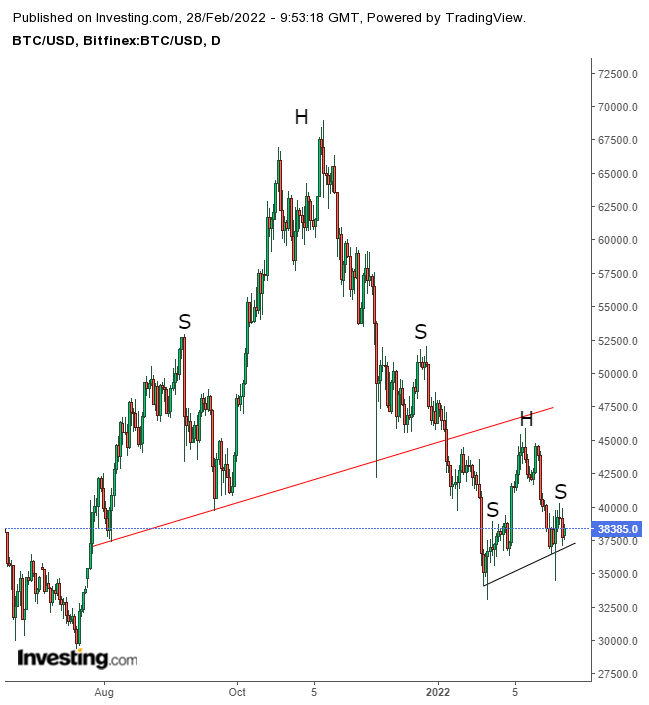
The digital token appears to be developing a small H&S continuation pattern to continue the more oversized H&S top work.
Oil opened 6% higher but pared its gains. The price jumped along with other commodities on fears of supply disruptions.
Shipowners who transport oil are demanding sharply higher rates to handle Russian crude, leaving buyers desperately searching for replacement cargo from the Middle East and US.
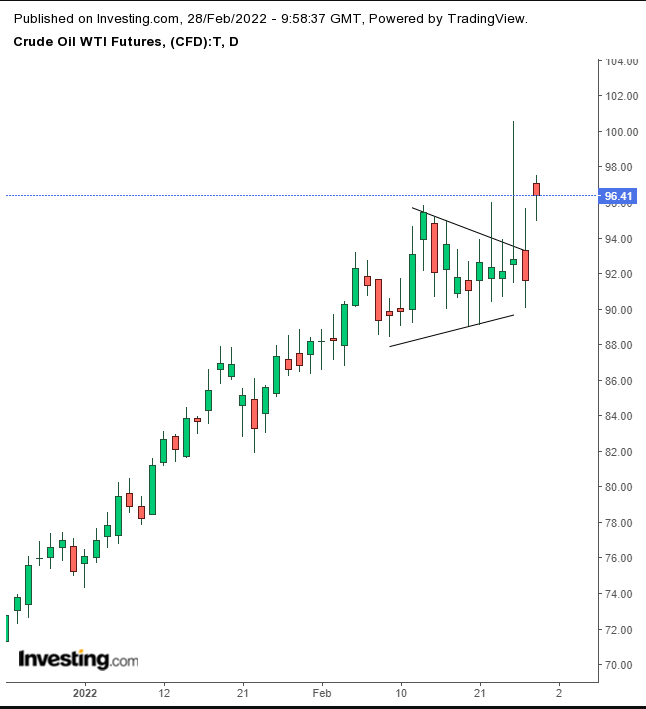
WTI completed a pennant which is promising to test the psychologically round $100 price per barrel for the first time since July 2014.
